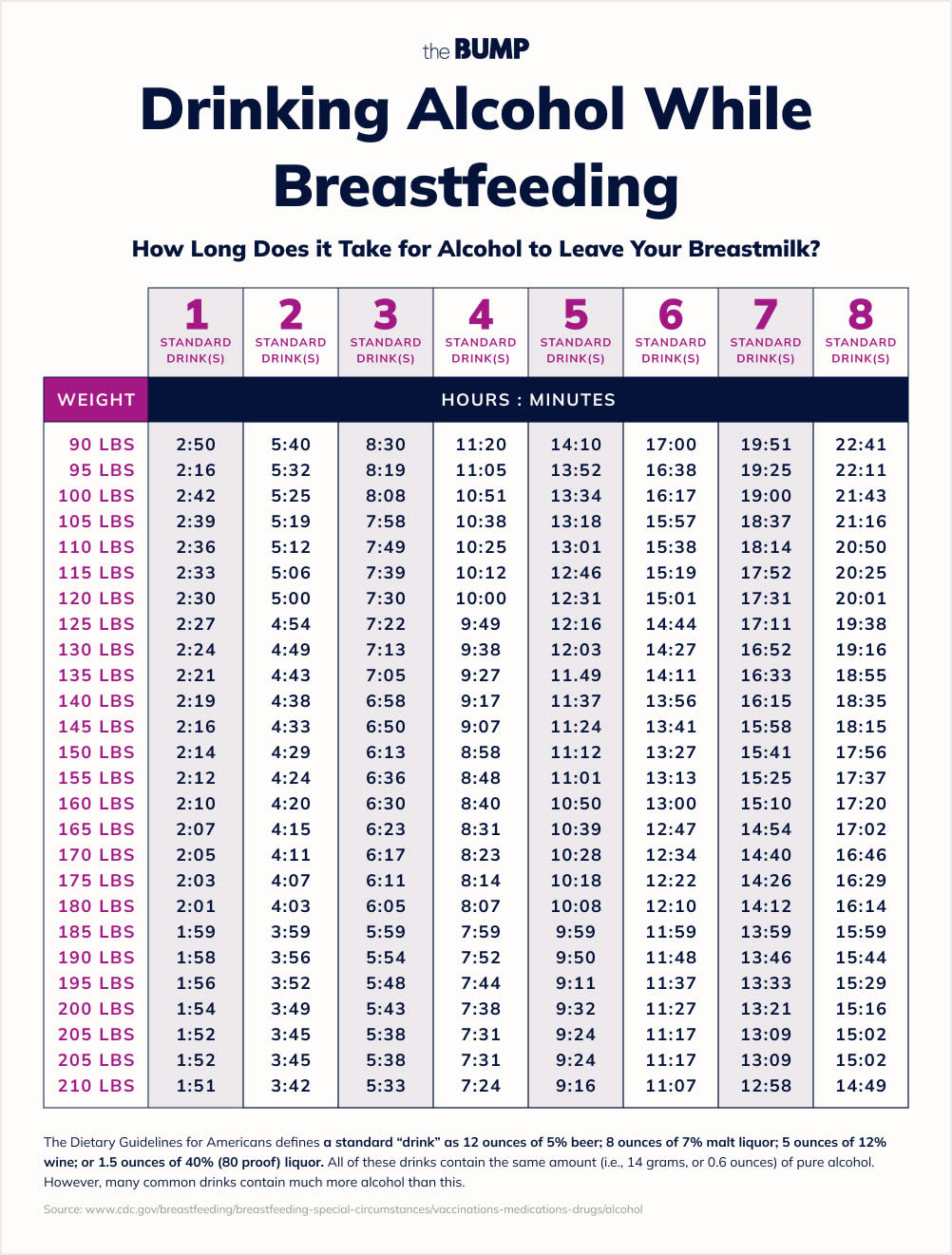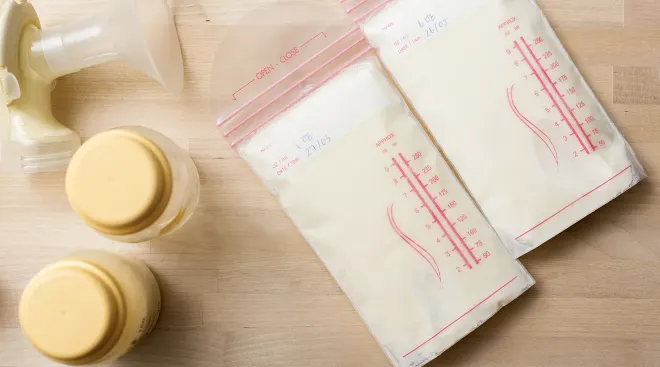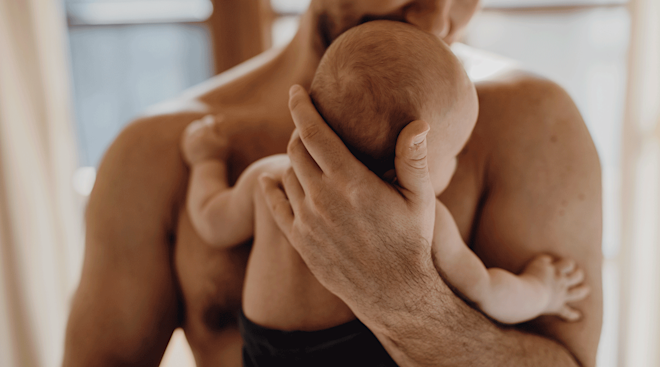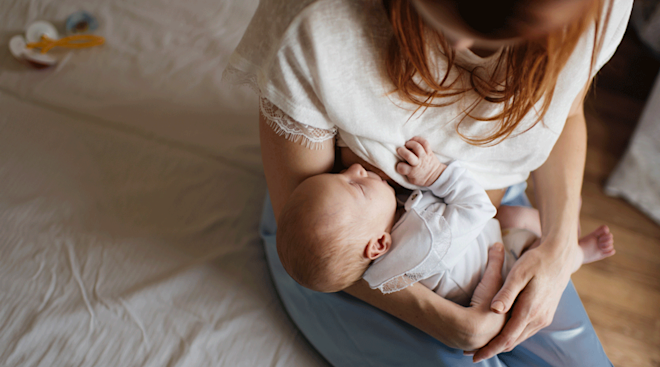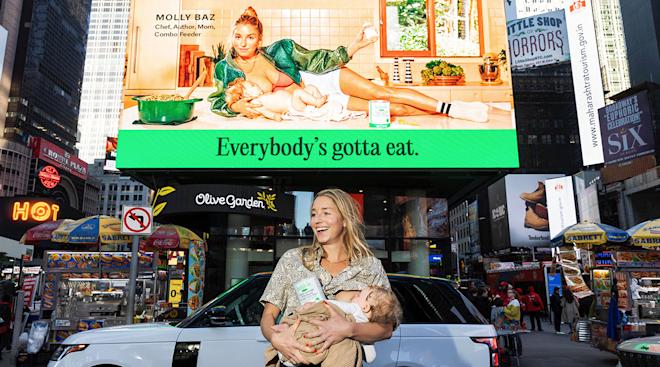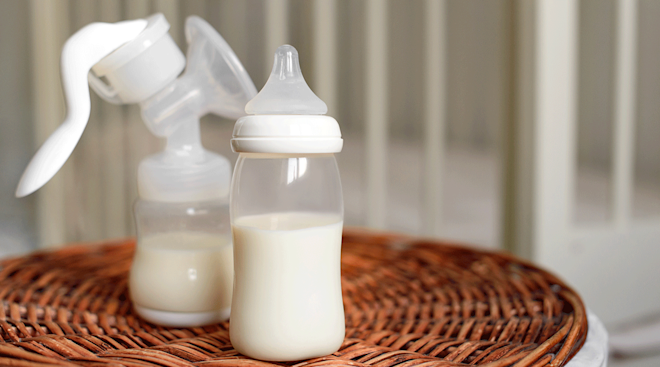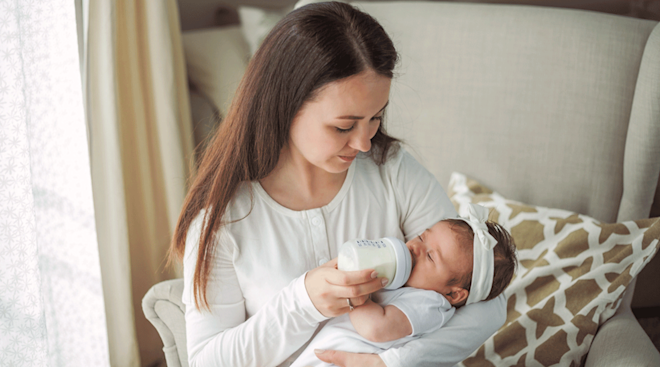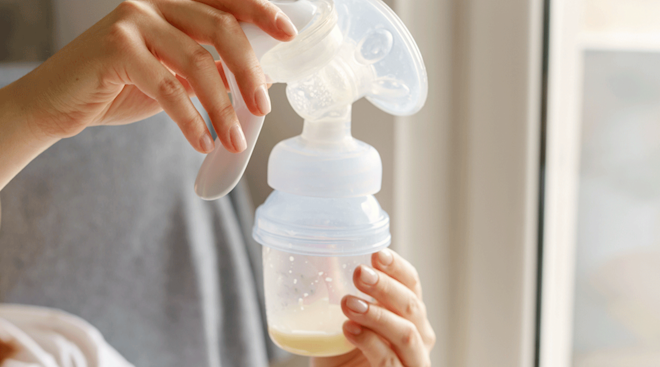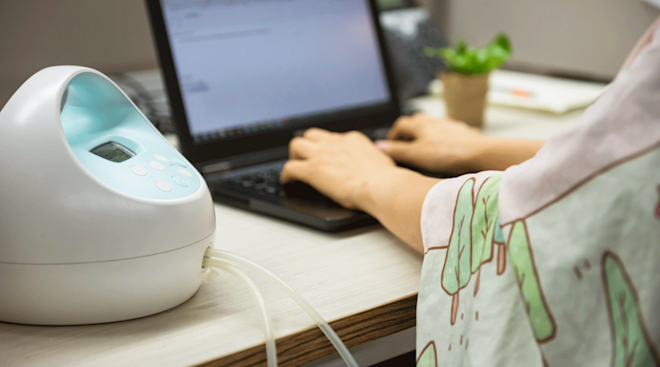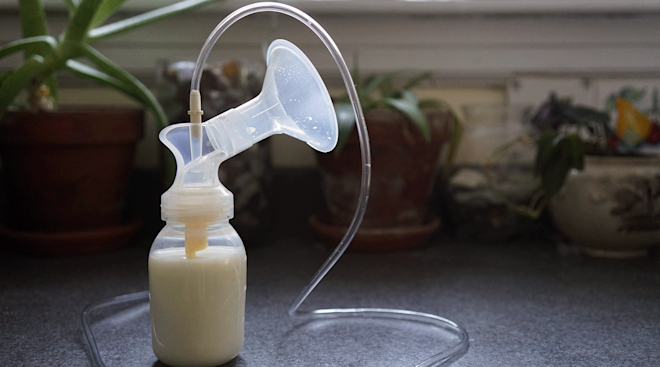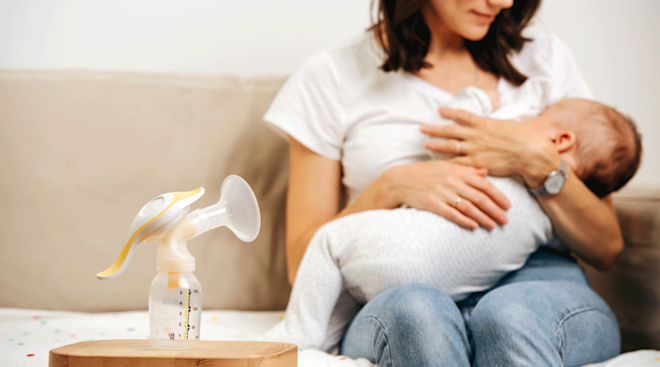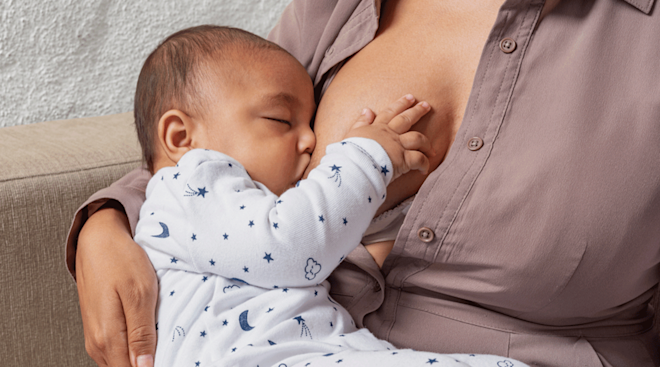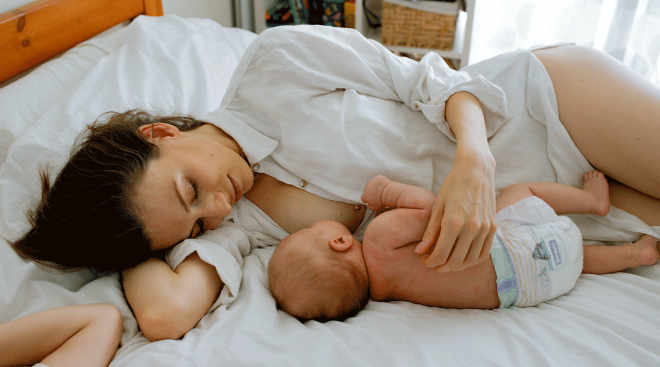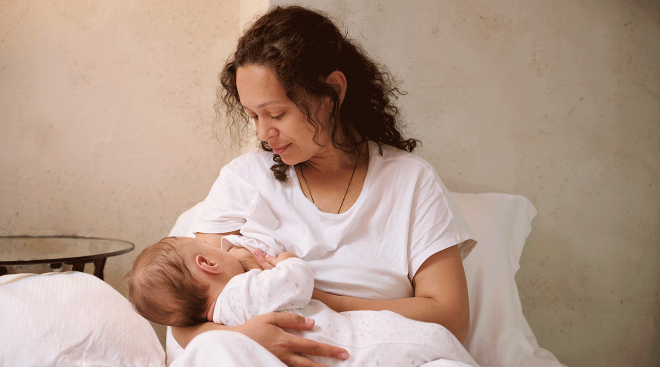Breastfeeding & Alcohol: Is It Safe to Drink?
After nine months of growing a human being inside of you, you may want to raise a glass to parenthood. But after giving birth, if you’ve decided to breastfeed, you may be wondering whether alcohol is okay to consume. After all, it could also affect baby since it can transfer into your breast milk. So can you drink while breastfeeding? We asked experts to give us the lowdown on breastfeeding and alcohol, including whether it’s safe, how long alcohol stays in breast milk, signs of alcohol in a breastfed baby and more. Keep reading for everything to know about drinking alcohol while breastfeeding.
This is the million dollar question. According to the Centers for Disease Control and Prevention (CDC), while it’s ideal to avoid drinking while breastfeeding, moderate alcohol consumption (up to one standard drink per day) is generally considered okay. “When appropriate steps are taken, breastfeeding can be safe after consuming alcohol,” says Nicole Peluso, IBCLC, a lactation consultant and manager of lactation services and education for Aeroflow Breastpumps.
Most medical authorities, including the American Academy of Pediatrics (AAP) and CDC, recommend waiting to nurse at least two hours after your last drink. In other words, it’s safest to enjoy a drink right after a nursing or pumping session because it gives your body enough time to metabolize the alcohol before baby’s next feeding (presumably in two hours). However, it’s important to note that this is generalized guidance that applies to the average breastfeeding mom. There are nuances to these recommendations, and you can take a more practical approach. Both Peluso and Leigh Anne O’Connor, IBCLC, a board-certified lactation consultant based in New York City, say that “if you’re sober enough to drive, you’re sober enough to breastfeed.” Depending on how long your nursing sessions are (and how quickly you drink), she adds that it may also be fine to have a glass of wine while you’re nursing. (Peluso notes that alcohol peaks in breast milk “anywhere from 30 to 60 minutes after you have one drink.”) Ultimately, breastfeeding and alcohol safety is largely dependent on several factors that have to do with how your individual body processes alcohol. You can take a stricter approach and follow CDC guidance, or make the personal decision to drink with caution.
Because breast milk is made from blood, you can assume your blood alcohol level and breast milk alcohol levels are about the same, Peluso explains. That said, how long alcohol stays in breast milk will vary from person to person, she adds, based on several factors, including:
- The amount of alcohol consumed
- How quickly the alcohol was consumed
- Whether the alcohol was consumed with food or on an empty stomach
- How much you weigh, and how fast your body is able to metabolize and break down alcohol
“Generally, smaller moms need more time to process and eliminate alcohol from their bloodstream,” Peluso says.
Biology and physiology aside, cultures also view breastfeeding and alcohol differently. “When I had my babies, my husband’s Italian grandmother would pour me a little glass of wine and say it’s good for the breast milk,” O’Connor says.
How much alcohol goes into breast milk?
According to Peluso, “less than 2 percent of the alcohol consumed by a mom reaches her blood and breast milk.” However, alcohol is present in a woman’s milk at the same level as in her blood. “The more you drink, the longer it takes for alcohol to clear your system,” she adds. And the type of drink consumed also makes a difference, since it’s about the amount of alcohol by volume, O’Connor says.
“Acceptable amounts of alcohol vary by type,” Peluso agrees. Per the AAP, “intake should be limited to no more than 0.5 grams of alcohol per kilogram of body weight, which for a 60 kilogram (approximately 132 pound) mom is approximately 2 ounces of liquor, 8 ounces of wine or two beers. The higher the alcohol content, the less volume should be ingested,” she adds. In other words, how safe drinking while breastfeeding is depends on what your definition of having a drink is and how you do it. There’s a difference between having a beer or glass of wine with a meal and taking shots at the bar, O’Connor reiterates.
The discussion of timing often involves the old “pump and dump” method, where breastfeeding people pump after drinking and then dump the milk so baby isn’t exposed to any alcohol. First, let’s clear up some myths: Pumping and dumping your breast milk won’t decrease the amount of alcohol in it, Peluso says. Similar to curing a hangover, time is the only way alcohol will leave your breast milk. Once you stop drinking, the alcohol level gradually falls as it leaves the breast milk and your bloodstream.
So do you have to pump and dump after drinking? The practical advice some experts offer is that if you’re sober enough to drive—or if it’s been two hours—then you don’t have to waste a single drop of that liquid gold. However, if you’re not sober enough to drive, then you will want to pump breast milk to maintain your [milk supply](https://www.thebump.com/a/increase-milk-supply and avoid engorgement, and dump it (as it’ll likely contain high alcohol concentrations that are unsafe for baby). “Essentially, pumping and dumping helps your body manage the missed feeding, but you’ll still need to feed baby other milk during this time,” Peluso says.
By the way, both Peulso and O’Connor advise against using breast milk alcohol strips. “Breast milk alcohol strips haven’t been sufficiently studied, so they aren’t an accurate way to measure alcohol levels in breast milk,” Peluso says.
Many women ask, “Does drinking alcohol while breastfeeding affect baby?” The answer is yes, it can. Alcohol gets into your milk. “Alcohol may change the taste of your breast milk and your baby may not like it,” Peluso says. Moreover, both experts say that other signs baby has consumed alcohol via breast milk include an increase in crying, drowsiness, lethargy, sickness, nausea, vomiting and trouble sleeping. In fact, research suggests that drinking alcohol while breastfeeding, even short-term, can impact baby’s sleep and reduce the amount of time they spend sleeping.
Again, any negative effects depend on how much you drink—and for how long. Continued long-term exposure to alcohol could have negative effects on baby’s growth, cognition and development, O’Connor says. This is because newborns have an immature liver that can’t metabolize alcohol, Peluso adds. Some of the long-term consequences may include delayed development, impaired immune function, weakness and decreased weight gain.
How alcohol impacts the breastfeeding mom
Alcohol can also delay a mom’s letdown and breast milk flow. “It may actually decrease her milk supply,” Peluso says. Studies back this up and have shown that drinking alcohol while breastfeeding can disrupt the hormones that are linked to milk production. A 2006 study even found that nursing after a drink or two could decrease baby’s milk intake by 20 to 23 percent.
Depending on how much you’re drinking, alcohol could, of course, also impair your motor skills, reaction times, decision-making skills, judgment and overall ability to safely care for an infant, Peluso says. If that’s the case, you’ll need to arrange for a sober, responsible adult to care for your baby during this time, whether that’s your partner, a grandparent or someone else.
You may have heard some people tell you to go have a beer to increase your milk supply. That’s because certain components used to make beer may act as galactagogues (foods that boost breast milk production). But before you go out and buy a six-pack, it’s important to note that there are no studies to actually support this old wives’ tale about beer and breastfeeding.
We get it: You work hard and sometimes just want to let your hair down and unwind. While abstaining from drinking is the only way to ensure baby won’t ever be negatively affected by alcohol in breast milk, like so many other things in life, the key is really moderation. Below, O’Connor and Peluso offer tips on how to keep yourself (and baby) safe if you’re drinking while breastfeeding:
- Consider the type of alcoholic drink and how many you’re having: Remember that the alcohol volume in a glass of wine and a shot of tequila isn’t the same. And if you have more than one, your body will need more time to metabolize the alcohol in your breast milk. If you’re planning to attend an event where you’ll be having a few drinks, it’s best to ensure baby has enough bottled breast milk or formula at the ready and a sober caregiver on tap ahead of time.
- Eat beforehand and stay hydrated: It’s important to ensure you’re drinking after eating, as your body absorbs alcohol through the stomach and small intestine. Also stay hydrated, O’Connor advises. According to La Leche League, you need to drink up to three liters of water while breastfeeding. Since alcohol dehydrates you, it’s all the more important to keep up with your water intake.
- Consider baby’s age and feeding schedule: Try to do your best to work around baby’s feeding schedule. Once you have a good sense of when baby will need their next feeding, you can time your drink accordingly.
Ultimately, how long alcohol stays in breast milk depends on several things, including how much you weigh and how much alcohol you consume. Use our drinking and breastfeeding chart below to see where you fall in the mix.
When it comes to drinking alcohol while breastfeeding, the choice is ultimately yours. It’s entirely possible to have a drink while breastfeeding—without guilt. Just be smart with your consumption and plan ahead as much as possible. For any specific questions and concerns, reach out to your doctor or lactation consultant. Ultimately, they’re your best resource for navigating drinking alcohol while breastfeeding.
Please note: The Bump and the materials and information it contains are not intended to, and do not constitute, medical or other health advice or diagnosis and should not be used as such. You should always consult with a qualified physician or health professional about your specific circumstances.
Plus, more from The Bump:
Nicole Peluso, IBCLC, CD, CAHPE, is a board certified lactation consultant, parenting educator, birth and postpartum doula, La Leche League Leader and manager of lactation services and education for Aeroflow Breastpumps. She has been in the field of lactation for over 20 years and is the mother of four children.
Leigh Anne O’Connor, IBCLC, LCCE, is a board-certified lactation consultant based in New York City with over 20 years of experience. She has served on the Board of the New York Lactation Consultant Association and has been an accredited La Leche League Leader for over two decades. O’Connor is also a Lamaze Certified Childbirth Educator.
Healthy Children (American Academy of Pediatrics), Alcohol & Breast Milk, July 2020
Centers for Disease Control and Prevention, Breastfeeding and Special Circumstances: Alcohol, October 2022
Pediatrics (American Academy of Pediatrics), Effects of Exposure to Alcohol in Mother's Milk on Infant Sleep, May 1998
Drugs and Lactation Database, Alcohol, July 2023
Developmental Psychobiology, Beer, breast feeding, and folklore, December 1993
Learn how we ensure the accuracy of our content through our editorial and medical review process.
Navigate forward to interact with the calendar and select a date. Press the question mark key to get the keyboard shortcuts for changing dates.

































